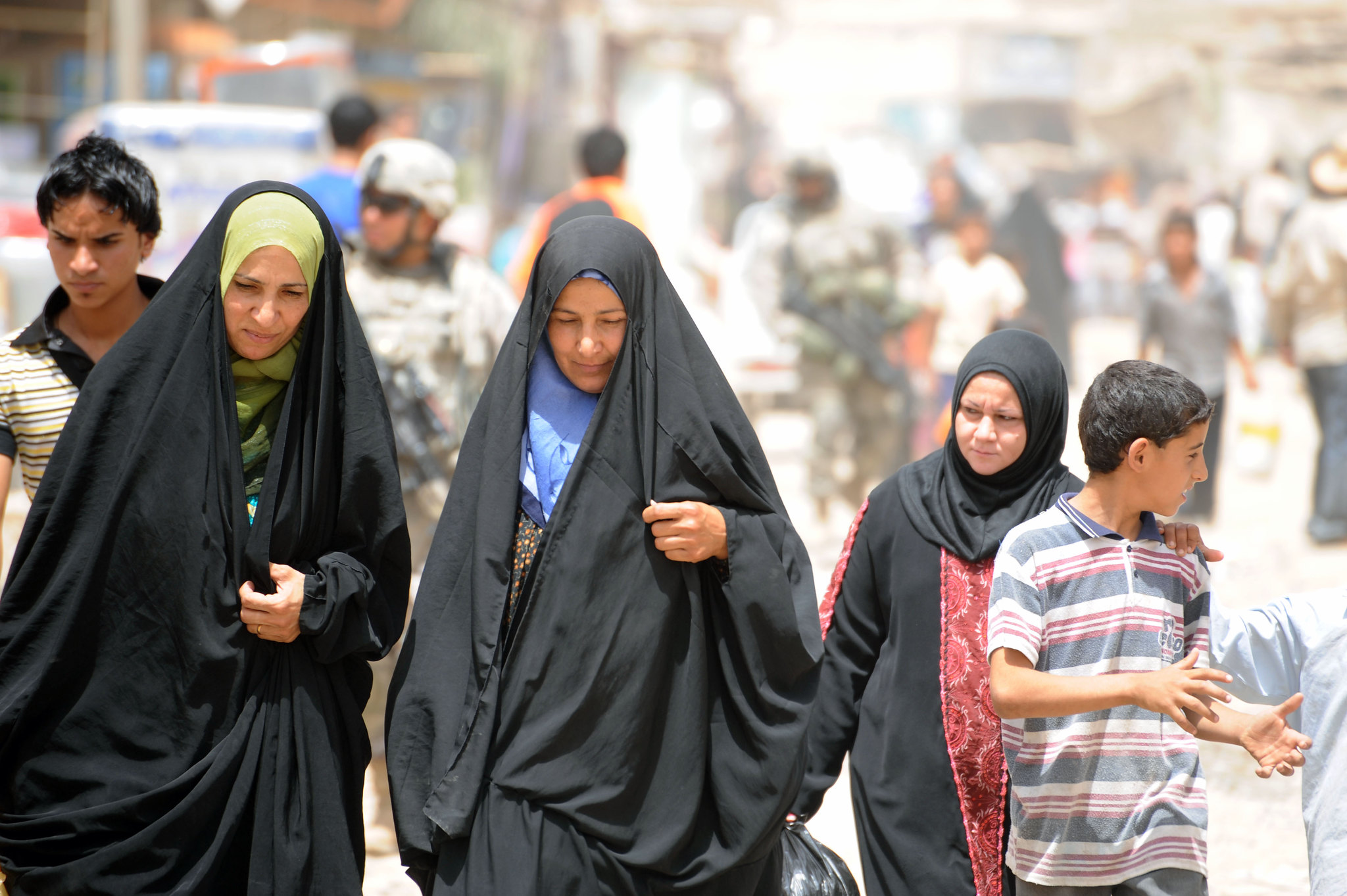How the Ja’fari Personal Status Law Deprived Iraqi Women of Their Rights

Photo by Staff Sgt. James Selesnick, Joint Combat Camera Center Iraq / DVIDSHUB (CC BY 2.0)
Photo by Staff Sgt. James Selesnick, Joint Combat Camera Center Iraq / DVIDSHUB (CC BY 2.0)
A recent legislative push by conservative politicians in Iraq is threatening the very independence of women in Iraq, sparking controversy and heavy reactions by Iraqi civil society. Strikingly, the new batch of laws contradicts the Iraqi constitution.
In a move that sparked widespread outrage within Iraq’s legal and civil society circles, the Iraqi Parliament voted on the Ja’fari Jurisprudence Personal Status Law (Twelver Shia Islamic jurisprudence school), proposing it as a foundation for amending Personal Status Law No. 188 of 1959. The draft, which contains over 330 legal articles and was prepared by the Shi’ite Endowment Office (Iraq’s Shia religious endowments authority), addresses issues of marriage, divorce, inheritance, and child custody in accordance with the principles of Twelver Imam jurisprudence.
While supporters view the law as a constitutional recognition of the Shi’ite component of Iraqi society and a reinforcement of legal pluralism, critics warn that it undermines the principle of equality and grants broad privileges to men and religious authorities at the expense of women’s rights and the rule of law.
Following the release of the new Ja’fari law and the circulation of its articles on social media, opposition voices—particularly from women—grew louder. Iraqi female activists and lawyers filed a legal challenge against the parliamentary vote, asserting that both the procedures of the Council of Representatives and the enacted law itself were unconstitutional. Among the most prominent voices were lawyers Qamar al Samarrai and Zainab Jawad, who were both excluded from the upcoming parliamentary elections scheduled for 11 November 2025, after publicly criticizing the Ja’fari law and calling for a return to the previous legislation.
Activists stated that the Ja’fari law does not reflect Islamic jurisprudence, but rather includes provisions that open the door to violations of women’s rights.
Activists stated that the Ja’fari law does not reflect Islamic jurisprudence, but rather includes provisions that open the door to violations of women’s rights. Among the controversial laws are those allowing the marriage of underage girls without specifying a legal minimum age, removing the requirement for judicial approval in cases of polygamy, stripping custodial mothers of their homes and children, eliminating the need for witnesses in marriage contracts, granting husbands the right to annul the marriage without the wife’s consent, and placing the authority over divorce and interpretation of rulings in the hands of religious clerics. None of these provisions existed in Law No. 188, which was based on Islamic jurisprudence and the Iraqi Civil Code, itself partially derived from the French civil law system.
Restrictive rules
Commenting on the provisions of the Ja’fari Personal Status Law, Professor Arkan al-Hamdani—law professor at Al-Mustaqbal University and member of the Babylon Bar Association—told The Amargi: “The Ja’fari Law is now in effect in Iraqi courts. However, it contains numerous shortcomings, foremost among them the issue of a wife’s inheritance rights. The law states that a wife is not entitled to inherit her husband’s property, including land and real estate. This is in direct contradiction to Islamic jurisprudence; it goes against verse 12 of Surah An-Nisa in the Holy Qur’an.”
Denying child custody to divorced mothers
Under the previous Personal Status Law, a divorced mother had the right to keep her children until the age of 12, after which the judge would allow the children to choose which parent to stay with. “Under the Ja’fari Law, a mother may only retain custody until the child is seven, and the clause allowing children to choose has been removed”, lawyer Arkan al-Hamdani detailed. Furthermore, according to the Ja’fari Law, a divorced mother immediately loses custody of her children if she remarries. This poses a serious risk, as it may push divorced women toward unofficial or unregistered marriages. Critics argue that the underlying intent of the law is to enable religious and political figures to take multiple wives through short-term, unofficial marriages conducted outside the courts, while women lose all their legal rights.
In effect, the Ja’fari Persona Status Law has legitimized ‘verbal marriage’ outside the jurisdiction of the courts and the rule of law.
According to the Ja’fari ruling, when a woman files a legal case after suffering injustice, abuse, or marital abandonment, her right to divorce cannot be executed without the approval of a religious authority. In other words, judicial authority in such cases has been transferred from the courts to religious clerics. If a woman has been raped or coerced into a relationship, she cannot take legal action if the man claims that he has married her verbally. In effect, the Ja’fari Persona Status Law has legitimized ‘verbal marriage’ outside the jurisdiction of the courts and the rule of law.
The new Ja’fari Personal Status Law, moreover, means that dowries from marriage contracts from previous decades will now be honored at their original value. Under the previous law, a woman seeking divorce would receive the equivalent of that amount adjusted for current value. For example, if a contract from the 1980s was recorded with a dowry of one thousand Iraqi dinars at the time, this amount would be valued at around ten million Iraqi dinars today. However, under the new Ja’fari Law, she would receive only the original amount: one thousand dinars—today, barely enough to buy her a cup of tea.
Civil Society Perspective
Human rights activist and President of the AISEN Organization for Human Rights and Sustainable Development, Ansam Salman, stated that the provisions of the Ja’fari Personal Status Law are, in their entirety, in violation of Iraqi law, the constitution, and international conventions ratified by Iraq. She emphasized that the most dangerous clause in the new law is the legalization of child marriage. The law allows anyone to marry an underage girl, often by purchasing her from financially struggling families living in remote rural areas with low living standards. This incentivizes families to pull their daughters out of school and marry them off. According to Salman, the law will encourage such marriages, contribute to rising illiteracy rates, and create a generation of uneducated mothers, ultimately harming families and increasing divorce rates.
Salman affirms that AISEN and other non-governmental civil society organizations are actively working to raise awareness about the dangers of this legislation. She claims that they are committed to exposing the harmful consequences of the law, which she describes as an injustice to motherhood, childhood, and the family. “We consider it a regressive piece of legislation that seeks to impose religious authority and patriarchal dominance and control over women and their lives,” she adds. Salman also notes that her organization is preparing a legal memorandum detailing the risks posed by the Ja’fari Law, to be submitted to bodies of the international community and relevant Iraqi governmental bodies. “We will engage seriously with the legislative authority to pass a law protecting against domestic violence.”
The Political Perspective
While legal experts clearly point out that the proposed law, in its current form, is an injustice to Iraqi women in many of its provisions, proponents argue that it reflects respect for Iraq’s sectarian diversity. Political analysts such as Dr. Aed Al-Hilali believe that each sect should have the right to regulate the personal affairs of its followers in accordance with their religious convictions. Supporters also claim that those who object to the law are ignoring the right of the Shi’ite majority to implement what they see as consistent with their beliefs.
The politics around this law are complex. Prime Minister Mohammed Shia’ Al-Sudani often cannot openly endorse all the provisions of the law, since doing so would place him in direct confrontation with broader civil and human rights movements. At the same time, a complete rejection of the law could be interpreted as a challenge to influential religious authorities. Therefore, the official discourse tends to adopt a middle-ground approach—supporting dialogue and amendments without fully aligning with either side.
Suha Kamel
Syrian journalist working in the field of digital media and investigative journalism.



